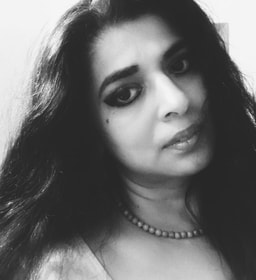Sophia Naz
|
Sophia Naz is a bilingual poet, essayist, author, editor and translator. She has been nominated twice for the Pushcart Prize, in 2016 for creative nonfiction and in 2018 for poetry. Her work features in numerous literary journals, including Poetry International Rotterdam, The Adirondack Review, Chicago Quarterly Review, Blaze Vox, Scroll, The Daily O, Cafe Dissensus, Guftugu, Gallerie International, Coldnoon, VAYAVYA, The Bangalore Review, Madras Courier, etc... Her Hindi poetry appears in the anthology Raushniyan. Poetry collections are Peripheries (2015) Pointillism (2017) and Date Palms (2017). A regular contributor to Dawn, Poetry Editor and columnist at The Sunflower Collective, editor of the City Quarterly, Sophia is also the founder of rekhti.org, dedicated to contemporary Urdu/Hindi poetry by women. Her site is www.trancelucence.net.
|
Interviews:
Interview on Women's Web : http://bit.ly/SophiaNaz
Interview on Indian Cultural Forum: https://indianculturalforum.in/2017/11/23/choosing-exile-poems-of-loss-and-displacement/
Interview on Indian Cultural Forum: https://indianculturalforum.in/2017/11/23/choosing-exile-poems-of-loss-and-displacement/
Contact:
Mini Interview (2019)
Your poetics?
A poet is the eye of the needle that stitches the seamless fabric of language into a new address. A bilingual poet such as myself uses a twin set of needles to knit a unique yarn, a polyglot palimpsest drawing attention not just to meanings explicit in the poetic text but to subtext and texture, somewhat like the Impressionists who dismantled painting’s centuries old focus on a hierarchy of persons and objects depicted and shifted it the materiality of the medium.
Your influences?
My influences are numerous and wide ranging, from the poetry riddles of Amir Khusro, the 13th century master of the double entendre, to Faiz Ahmed Faiz who transmogrified the classical tropes of the ghazal into masterpieces of political protest, the taboo shattering frankness of Famida Riaz, to the contemplative Zen haiku of Matsuo Basho, to Latin American poets including Neruda, Paz, Cortazar and Jaime Sabines. Among female poets of the subcontinent, Imtiaz Dharkar, distilled perfectly my own feelings of suffocation and rebellion. Nizar Qabbani and Mahmoud Darwish for their evocative writings on exile and loss. Among writers Anais Nin, Marguerite Yourcenar, Olga Broumas, Audre Lorde have inspired me, so has Saadat Hasan Manto. They both dealt with taboos of their day and with people at the margins of so-called respectable society.
Why is the Matwaala fest and collective relevant and needed?
I was completely blown away by Yogesh Patel’s interview and astounded that I had not heard of him until Matwaala highlighted his work. It is so crucial for poets of the South Asian diaspora to be aware of each other and of the work that they are doing. Each of us are dealing with the complexities of our hyphenated identities and (m)othertongues in our own way and listening to and supporting each other through an initiative like Matwaala is both intellectually rewarding and collectively empowering.
A poet is the eye of the needle that stitches the seamless fabric of language into a new address. A bilingual poet such as myself uses a twin set of needles to knit a unique yarn, a polyglot palimpsest drawing attention not just to meanings explicit in the poetic text but to subtext and texture, somewhat like the Impressionists who dismantled painting’s centuries old focus on a hierarchy of persons and objects depicted and shifted it the materiality of the medium.
Your influences?
My influences are numerous and wide ranging, from the poetry riddles of Amir Khusro, the 13th century master of the double entendre, to Faiz Ahmed Faiz who transmogrified the classical tropes of the ghazal into masterpieces of political protest, the taboo shattering frankness of Famida Riaz, to the contemplative Zen haiku of Matsuo Basho, to Latin American poets including Neruda, Paz, Cortazar and Jaime Sabines. Among female poets of the subcontinent, Imtiaz Dharkar, distilled perfectly my own feelings of suffocation and rebellion. Nizar Qabbani and Mahmoud Darwish for their evocative writings on exile and loss. Among writers Anais Nin, Marguerite Yourcenar, Olga Broumas, Audre Lorde have inspired me, so has Saadat Hasan Manto. They both dealt with taboos of their day and with people at the margins of so-called respectable society.
Why is the Matwaala fest and collective relevant and needed?
I was completely blown away by Yogesh Patel’s interview and astounded that I had not heard of him until Matwaala highlighted his work. It is so crucial for poets of the South Asian diaspora to be aware of each other and of the work that they are doing. Each of us are dealing with the complexities of our hyphenated identities and (m)othertongues in our own way and listening to and supporting each other through an initiative like Matwaala is both intellectually rewarding and collectively empowering.

